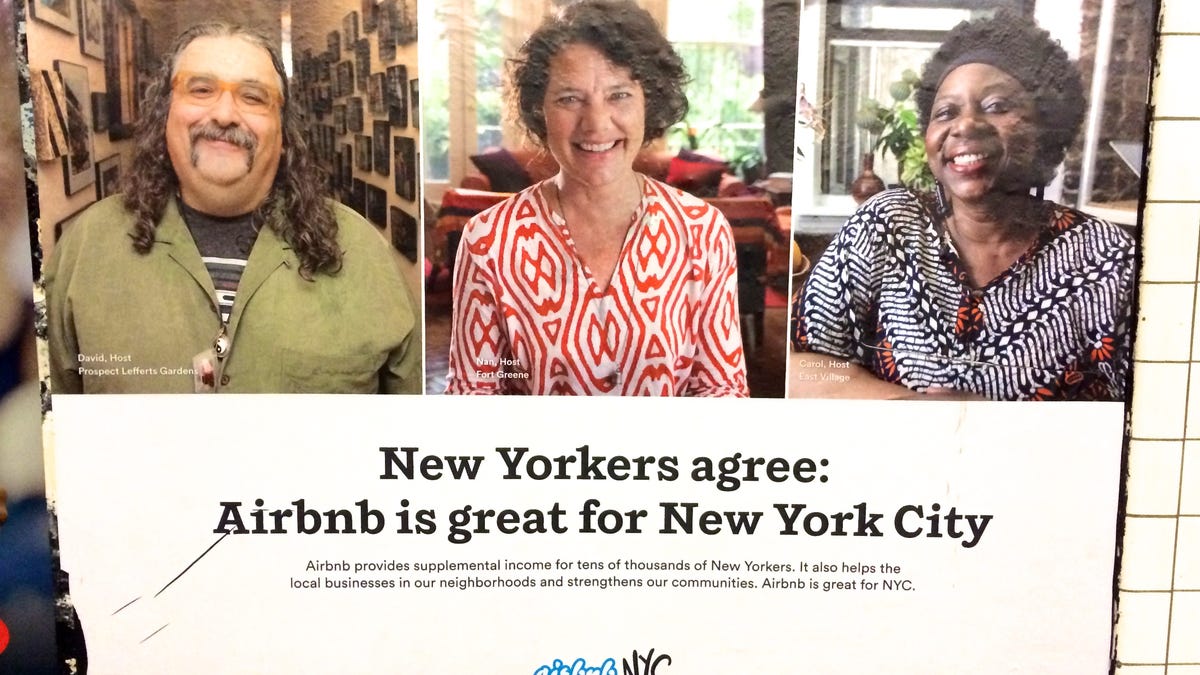Airbnb is freaking out over NYC's report on rising rents
The tit for tat between the home-rental site and the city's comptroller rages.

Airbnb lined the city's subway stations with these posters for one of its marketing campaigns.
The battle between Airbnb and New York City's comptroller just got taken up a notch.
Airbnb's head of global policy sent an open letter to Comptroller Scott Stringer on Monday insinuating the government official is abusing his power to further his own political career.
"Responsibility in a democracy includes ensuring that government officials provide objective facts and do not abuse their powers to misuse information, especially in an effort to advance their own political career," Airbnb's Chris Lehane wrote. "Democracy cannot function if the public cannot trust the integrity of information disseminated by government."
The letter comes on the heels of a report Stringer released last Thursday that says Airbnb is responsible for nearly 10 percent of rental increases in New York City between 2009 and 2016.
Since the report came out, Airbnb has been on the defensive. It's held press calls adamantly denying having any effect on rent prices, while also issuing statements calling the comptroller's report "flawed," "wrong" and saying Stringer "manipulated the data." The company also insinuated the hotel lobby, its longtime rival, is a backer of the report.
"I would say if the hotel key sticks in the door, turn it," Lehane said during a press call on Monday morning.
Stringer has said Airbnb's allegations are "desperate attempts to distract from its effect on rising housing costs" and that he stands by the findings in his report.
"Our report explicitly stated that Airbnb was responsible for 9.2 percent of the increase in housing costs -- not 100 percent," the comptroller's office wrote in an FAQ about the report on Monday. "Our analysis covered 2009 to 2016, and by that time, the damage by Airbnb to affordability was already done."
Stringer said Monday that if Airbnb wanted to help New York City with affordability issues, it should work with government officials and release its raw data -- something it's continually refused to do.
"The company is attempting to smear our independent analysis rather than opening their books," Stringer tweeted on Monday.
'Same old, same old'
When Airbnb launched its site for short-term home rentals in 2008, there weren't yet laws governing how people could use the platform -- and it was pretty much a free-for-all.
While Airbnb said it helped regular people make ends meet and make extra cash by listing their homes on the site, the company also became the focus of intense criticism. Residents, regulators, and housing advocates said unscrupulous landlords took long-term rentals off the market to earn a quick buck. They also said the short-term rentals meant cities lost tax revenue that hotels paid, while also reducing rental stock and exacerbating the housing crunch.
Airbnb has clashed with cities around the world, including San Francisco, Portland, New Orleans, London, Paris and Berlin.
But, over the past three years, Airbnb has begun working with cities. It started collecting hotel taxes in many cities and agreed to regulations, like limits on the number of places each host could list and caps on how many nights they could rent out their home. Airbnb takes a cut of every rental -- typically between 9 percent and 15 percent.
Some of Airbnb's battles keep raging, however, like its feud with New York. It's illegal for people to rent out a whole apartment on Airbnb in the city for fewer than 30 days if they're not present. New York's rules are particularly strict because officials say they've seen too many property owners converting residential buildings into impromptu hotels.
In 2014, New York Attorney General Eric Schneiderman released a 41-page report saying that as many as 72 percent of the city's Airbnb rentals "appeared to violate" state and local laws. He said those bookings resulted in roughly $304 million in revenue for hosts and nearly $40 million for Airbnb.
At the time, Airbnb said Schneiderman's report relied on "incomplete and outdated information."
Now, in its back-and-forth with Stringer, the company has a similar response.
"The report was based on data from AirDNA, an independent, for-profit, third party whose data gathering and operations are not affiliated with Airbnb," Lehane wrote in his letter to Stringer on Monday. "After your report was released, AirDNA, which had not been contacted in advance by your office, said that you 'improperly obtained' and then 'incorrectly interpreted' their data."
For his part, Stringer called this the "same old, same old from Airbnb."
"This is the latest in a long history of Airbnb distracting and discrediting any independent governmental investigations into the effect their illegal operations have on local housing markets," Stringer said in a statement on Monday. "Airbnb needs to stop distracting and release the raw data."
CNET Magazine: Check out a sample of the stories in CNET's newsstand edition.
Life, disrupted: In Europe, millions of refugees are still searching for a safe place to settle. Tech should be part of the solution. But is it?

